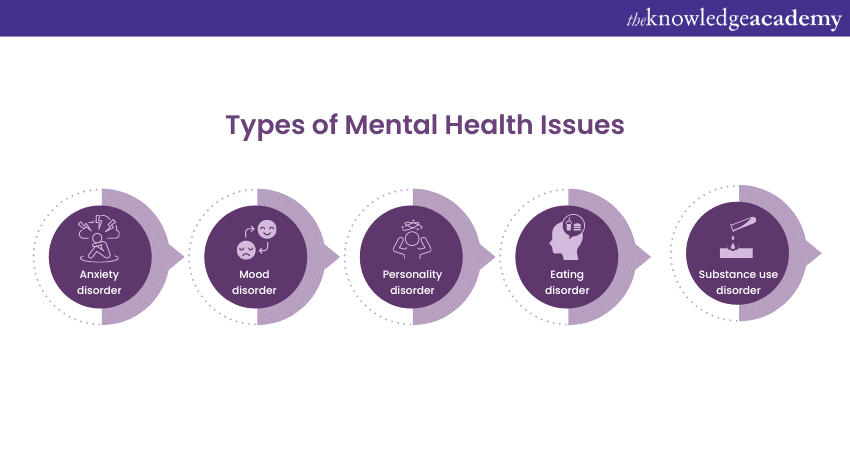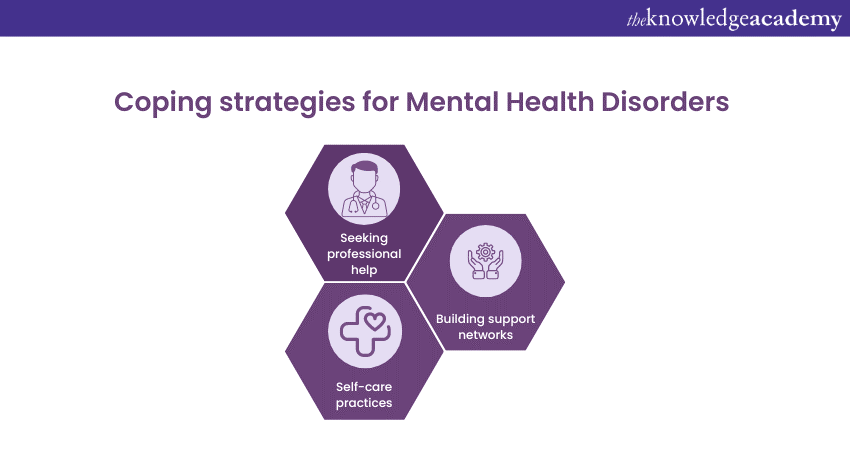We may not have the course you’re looking for. If you enquire or give us a call on +44 1344 203999 and speak to our training experts, we may still be able to help with your training requirements.
Training Outcomes Within Your Budget!
We ensure quality, budget-alignment, and timely delivery by our expert instructors.

Mental Health is a significant aspect of our overall well-being, yet it is often overlooked or stigmatised in society. Bad Mental Health affects how we think, feel, and behave, shaping our experiences and interactions with the world. Thus, it is essential to understand the complexities of Mental Health Issues, raise Mental Health awareness, and provide support to those who are struggling.
According to Statista, the most common Mental Health disorders recorded are psychiatric disorders, depression, and anxiety in the United Kingdom (UK). Conditions like anxiety, depression, bipolar disorder, etc, are just a few of the many Mental Health disorders which impact people's lives and relationships. In this blog, learn about the complicated world of Mental Health Issues, including the different sorts, the causes, strategies to spot them, and solutions.
Table of Contents
1) The significance of Mental Health
2) Types of Mental Health Issues
3) Factors contributing to Mental Health Issues
4) How to identify Mental Health disorders?
5) Coping strategies for Mental Health disorders
6) Conclusion
The significance of Mental Health
Mental well-being directly impacts every aspect of one's life, including relationships, work, and overall quality of life. Just as one prioritises physical health by eating nutritious food, exercising, and seeking medical care, it is equally crucial to prioritise your mental well-being.
When you take care of your mental well-being, you are better equipped to handle stress, face challenges, and make informed decisions. It allows one to build resilience, which is essential in navigating the ups and downs of life.
Furthermore, mental well-being is not just the absence of mental illness; it encompasses your ability to enjoy life to the fullest and manage Mental Health Illness effectively. It enables one to experience positive emotions, maintain healthy relationships, and find a sense of purpose and meaning in their lives.
Types of Mental Health issues
Mental Health problems are common conditions that affect how we think, feel, and behave. They can be diagnosed by examining certain symptoms, causes, and treatments, and they can impact our well-being, relationships and daily functioning. Some types of Mental Health Issues are as follows:
Types of Mental Health Issues
Mental Health problems are common conditions that affect how we think, feel, and behave. They can be diagnosed by examining certain symptoms, causes, and treatments, and they can impact our well-being, relationships and daily functioning. Some types of Mental Health Issues are as follows:
Anxiety
Anxiety can be a feeling of nervousness or fear that can affect your thoughts, emotions, and actions. It can be caused by different factors and can be treated in different ways, including therapy.
Anger
It is an emotion that can be helpful or harmful depending on how it is expressed. It can be managed by understanding its triggers, finding healthy ways to cope, and seeking professional help if needed.
Personality disorders
A group of conditions that affect how a person relates to themselves and others. Personality disorders can cause difficulties in coping with emotions, impulses, and relationships. They are often misunderstood and stigmatised. They can be treated with psychological therapies, medication, and self-care.
Eating problems
A range of behaviours or attitudes towards food that affect physical and Mental Health. Eating problems can include eating too much or too little, bingeing or purging. They can be treated with psychological therapies, medication, nutrition support, and self-help strategies.

Bipolar disorder
A condition that affects mood, causing periods of depression and periods of mania or hypomania. Mania is a state of extremely high mood, energy, and activity, while hypomania is a milder form. Bipolar disorder can be managed with medication, psychological therapies, and lifestyle changes.
Body Dysmorphic Disorder (BDD)
A condition that causes a person to have a distorted view of their appearance and to obsess over perceived flaws. BDD can affect self-esteem, relationships, and daily functioning. It can be cured with cognitive behavioural therapy (CBT), medication, and self-help techniques.
Borderline Personality Disorder (BPD)
BPD is a condition that affects how a person feels, thinks and relates themselves to others. BPD can cause problems with mood, impulsivity, self-image, and relationships. It can be treated with psychological therapies, medication, and self-care.
Depression
A low mood that lasts for a long time and affects everyday life. Depression can cause feelings of sadness, hopelessness, guilt, and loss of interest. It can be treated with psychological therapies, medication, and self-help strategies.
Dissociation and dissociative disorders
A way of coping with trauma or stress is by disconnecting from reality or oneself. Dissociation can cause memory loss, identity confusion, or feeling detached. Dissociative disorders are more severe forms of dissociation that affect a person’s sense of identity and memory. They can be treated with psychological therapies, medication, and self-care.
Hearing voices
A common experience that involves hearing sounds or voices that others cannot hear. Hearing voices can be positive or negative and may have different meanings for different people. They can be managed with psychological therapies, medication, peer support groups, and self-help techniques.
Hoarding
A behaviour that involves acquiring and keeping items that have little or no value. Hoarding can affect a person’s living space, health, and relationships. It can be treated with CBT, medication, and practical support.
Hypomania and mania
States of elevated mood that are associated with bipolar disorder or other conditions. Hypomania is a milder form of mania that causes increased energy, confidence, and creativity. Mania is more severe and can cause impaired judgment, delusions, or psychosis. They can be managed with medication, psychological therapies, and lifestyle changes.
Loneliness
A feeling of being isolated or disconnected from others. It can affect anyone at any age or stage of life. It can be overcome by seeking social support, joining activities or groups, volunteering, or seeking professional help if needed.
Obsessive-Compulsive Disorder (OCD)
A condition that causes a person to have unwanted thoughts (obsessions) and repetitive behaviours (compulsions) that they feel unable to control. OCD can affect various aspects of life, such as hygiene, order, or safety. It can be treated with Cognitive Behavioural Therapy (CBT), medication, and self-help strategies.
Panic attacks
A panic attack is a brief, intense and sudden episode of fear or nervousness that can cause physical and emotional symptoms. It may make you feel like you are in danger or losing control.
Paranoia
A feeling of being threatened or persecuted by others who may harm or deceive you. Paranoia can range from mild suspicion to severe delusion and may be caused by stress, trauma, or Mental Health conditions. It can be treated with psychological therapies, medication, and self-care.
Phobias
A type of anxiety disorder that causes a person to have an intense and irrational fear of a specific object, situation, or activity. Phobias can interfere with daily life and cause panic attacks. They can be treated with exposure therapy, CBT, medication, and self-help techniques.
Postnatal depression & perinatal Mental Health
It is a term covering a range of Mental Health Issues that can affect women during pregnancy or after childbirth. Postnatal depression is a common type of depression that can cause low mood, anxiety, or guilt. Perinatal Mental Health problems can also include psychosis, OCD, or PTSD. They can be treated with psychological therapies, medication, and peer support.
Factors contributing to Mental Health Issues
There are various factors affecting Mental Health that drive the development of Mental Health disorders in people. It is important to be aware of these factors as they can help determine the root cause of a certain disorder and provide an opportunity for early detection and treatment. Here are the three major factors affecting Mental Health which contribute to Mental Health disorders:
1) Biological factors
Biological factors play a crucial role in determining the mental well-being of a person. Genetic predisposition and hereditary factors can make specific individuals more susceptible to developing Mental Health disorders. Neurochemical imbalances in the brain, such as irregularities in levels of serotonin and dopamine, can also contribute to the onset of these issues.
2) Environmental factors
The environment in which individuals live and grow up can greatly influence their mental well-being. Adverse childhood experiences, such as trauma, neglect, or abuse, can have long-lasting effects on mental well-being. Socioeconomic factors, including poverty, unemployment, and inadequate access to education and healthcare, can increase the risk of Mental Health problems.
3) Psychological factors
Psychological factors encompass an individual's thoughts, emotions, and behaviour patterns. Certain personality traits or coping styles can make individuals more vulnerable to Mental Health disorders. Low self-esteem, perfectionism, negative thinking patterns, and poor coping mechanisms can deteriorate mental well-being.

How to identify Mental Health disorders?
There are common signs and indicators that can help identify when someone may be experiencing a mental difficulty. Here are some key aspects to consider when identifying Mental Health issues:
Signs and symptoms
Multiple signs and symptoms are associated with different disorders. These can include persistent sadness, anxiety, or irritability, changes in sleep patterns, appetite or weight fluctuations, difficulty concentrating, withdrawal from social activities, sudden mood swings, excessive worrying, or unexplained physical symptoms.
Changes in functioning
Noticeable changes in performance at work or school, decreased productivity, difficulties in maintaining relationships, and a lack of interest in activities once enjoyed can indicate a Mental Health concern. Additionally, individuals may experience difficulties managing everyday tasks, self-care, or decision-making, which can indicate underlying Mental Health challenges.
Duration and intensity
It is important to consider the duration and intensity of the symptoms. Mental Health disorders persist over time and affect various aspects of a person's life. If symptoms are persistent, recurring, or significantly impairing an individual's ability to function, it may suggest the presence of a Mental Health disorder.
Coping strategies for Mental Health disorders

Coping strategies can empower individuals to participate in their well-being and actively promote resilience. Here are some valuable coping strategies to consider:
1) Seeking professional help: One of the most important coping strategies is to reach out to Mental Health professionals. They can provide a comprehensive assessment, offer appropriate treatment options, and guide individuals towards recovery.
2) Building support networks: Developing a strong support system is vital for coping with Mental Health challenges. Surround yourself with understanding individuals who can offer encouragement or join support groups where you can connect with similar individuals.
3) Self-care practices: Engaging in self-care promotes overall well-being and can positively impact Mental Health. This can include getting enough sleep, eating nutritious meals, and practicing relaxation techniques such as deep breathing, meditation, or yoga.
Conclusion
In conclusion, Mental Health Issues are prevalent and impactful, affecting individuals of all ages and backgrounds. It is imperative that we prioritize Mental Health, both as individuals and as a society. We hope this blog has helped you understand the importance of focusing on Mental Health, the factors that contribute to its downfall, and how to improve mental health through various means.
Equip yourself with the tools to handle stress and build resilience. Sign up for our Handle Stress And Develop Your Resilience Training Course now!







 Top Rated Course
Top Rated Course




 If you wish to make any changes to your course, please
If you wish to make any changes to your course, please


